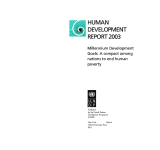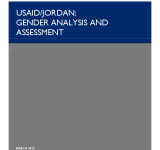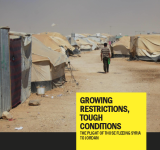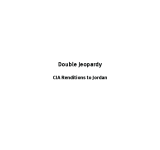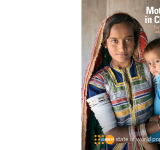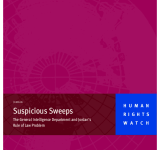This report provides an assessment of the Millennium Development Goals;; laid out by the UN Millennium Declaration. The UN Millennium Declaration was adopted in September of 2000 as a commitment on the part of the world's leading nations to reduce poverty;; improve health and promote peace;; human rights;; and environmental sustainability. The Millennium Development Goals are specific;; measurable targets that aim to reduce extreme global poverty by the year 2015. This report analyzes the challenges and barriers to meeting these goals as of 2003;; examining the successes and failures of various nations and the gaps that exist between regions and countries with regards to economic growth and human development. This report then examines the successes and failures of public and private policies with regards to hunger;; health;; water and sanitation;; education;; and environmental sustainability. This report also analyzes the participation of civil society throughout the world and the mobilization of grassroots support for the various human development goals. Finally;; this report presents a number of recommendations on what countries can do to best support these goals.
human rights
The report presents an up-to-date analysis of gender disparities in Jordan to inform development assistance programs by the USAID for the 2013-2017 strategic plan. The assessment report is prepared by the Global Health Technical Assistance Project;; funded by USAID Jordan and therefore;; it is based on a literature review and field work of the 21 focus group discussions held in Amman;; Irbid;; Tafileh and Zarqa. The report establishes that Jordan has begun to transition to a knowledge-based economy with the national advantage as its people. It also points out that despite the investments that have helped address gender equality issues;; Jordan continues to bear low female participation in the labor markets;; gender stereotypes about the role of females and males and conservative cultural norms. The report includes a sector-by-sector analysis;; recommendations;; gender review and an illustrative implementation plan. It concludes with key recommendations on the wide breadth of the USAID Jordan portfolio with a key emphasis on gender issues.
وجه هذا التقرير إلى لجنة سيداو من أجل توفير أحد المعلومات وأكثرها دقة;; بالإضافة إلى دراسة وتحليل السياسات الإيجابية والتشريعات المتخذة في سبيل تقدم ونهوض المرأة وإيجاد مواطن الضعف التي تعمل على تأخير التطور;; وتساه مفي تعزيز التفاوت وعدم المساواة. ويتكون التقرير من ستة مكونات رئيسية: 1. تحفظات الأردن على اتفاقية سيداو;; 2. مواءمة اتفاقية سيداو مع التشريعات الوطنية;; 3. التمثيل السياسي للنساء;; 4. العنف ضد النساء;; 5. الحقوق المتساوية للنساء في العائلة;; 6. أوضاع النساء الضعيفات والمهمشات. ويوفر التقرير تقييماً شاملا للمكونات الستة وذلك من خلال تقييم الجهود الرسمية في سبيل تطبيق اتفاقية سيداو;; وتقييم جهود المجتمع المدني تجاه رصد مراقبة التزام الأردن بالمواثيق الدولية;; إلى جانب تقديم توصيات مقترحة للملاحظات الختامية الجديدة.
This report addressed CEDAW Committee by providing a solid and up-to-date information set and analysis of positive policies and legislation taken for women’s advancement and weaknesses that are delaying progress and sustaining disparities. The report covers six components: 1. Jordan’s reservations on CEDAW;; 2. Harmonization of CEDAW into legislation;; 3. Political representation;; 4. Violent against women;; 5. Equal rights in the family;; 6. Conditions of vulnerable and marginalized women. It also provides an overall assessment of the six components covering 3 areas: assessment of the official efforts towards the implementation of CEDAW;; also;; assessment of the civil society efforts and strategies towards monitoring Jordan’s commitment to obligations;; and suggested recommendations for the new concluding observations.
يستند مضمون هذا التقرير المتعلق بالأردن إلى حد كبير إلى زيارة بحثية قامت بها منظمة العفو الدولية إلى البلاد في يونيو/حزيران 2013. وقد التقى وفد المنظمة بممثلي السلطات الأردنية ووكالات الأمم المتحدة والوكالات الإنسانية الدولية والمنظمات غير الحكومية والجمعيات الخيرية;; فضلاً عن أكثر من 150 لاجئاً من سوريا في مجتمعات اللجوء والمجتمعات المضيفة. ونشرت منظمة العفو الدولية هذا التقرير بهدف لفت الانتباه إلى الصعوبات التي يواجهها الفارون من سوريا طلباً للسلامة. وفي الوقت الذي يركز فيه التقرير بشكل رئييس على الأوضاع في الأردن;; فإنه يتضمن تحديثا للمعلومات التي كانت المنظمة قد نشرتها في السابق بشأن التحديات التي يواجهها اللالجئون من سوريا في البلدان المجاورة. وقد أمعنت منظمة العفو الدولية النظر في التحديات التي يواجهها اللاجئون في الأردن;; ولا سيما أولئك الذين يقطنون في مخيم الزعتري;; وهو أضخم مخيمات اللاجئين من سوريا في الأردن. وأجرت المنظمة تحقيقاً حول معاناة اللاجئين;; ليس من ظروف المعيشة القاسية في الصحراء فحسب;; وإنما أيضاً من ارتفاع معدلات الجريمة وغيرها من المخاوف الأمنية.
يوثق هذا التقرير المكون من 36 صفحة كيف عملت دائرة المخابرات العامة الأردنية كسجّان ومحقق بالوكالة للاستخبارات المركزية الأميركية منذ 2001 وحتى 2004 على الأقل. وفيما تلقت دول قليلة أشخاصاً تم تسليمهم إليها من قبل الولايات المتحدة أثناء هذه الفترة;; فليس من المعتقد أن ثمة دولة أخرى تسلمت قدر ما تلقى الأردن من أشخاص.
يبرز تقرير حالة سكان العالم 2013;; الصادر عن صندوق الأمم المتحدة للسكان;; التحديات الرئيسية المتعلقة بحمل المراهقات وآثاره الخطيرة على تعليم الفتاة;; وصحتها;; وفرصها في العمل في الأجل الطويل. ويبين التقرير أيضا ما يمكن القيام به من أجل الحد من هذا الاتجاه وحماية حقوق الإنسان الخاصة بالفتيات ورفاهتهن.
This 66-page report documents the arbitrary arrest and abusive treatment of detainees held at the General Intelligence Department's (GID) central detention facility in Amman. The report finds that there is no clear basis in Jordanian law for the GID's law enforcement role;; and that detainees cannot seek an independent judicial review of the grounds for arrest and continued detention.
